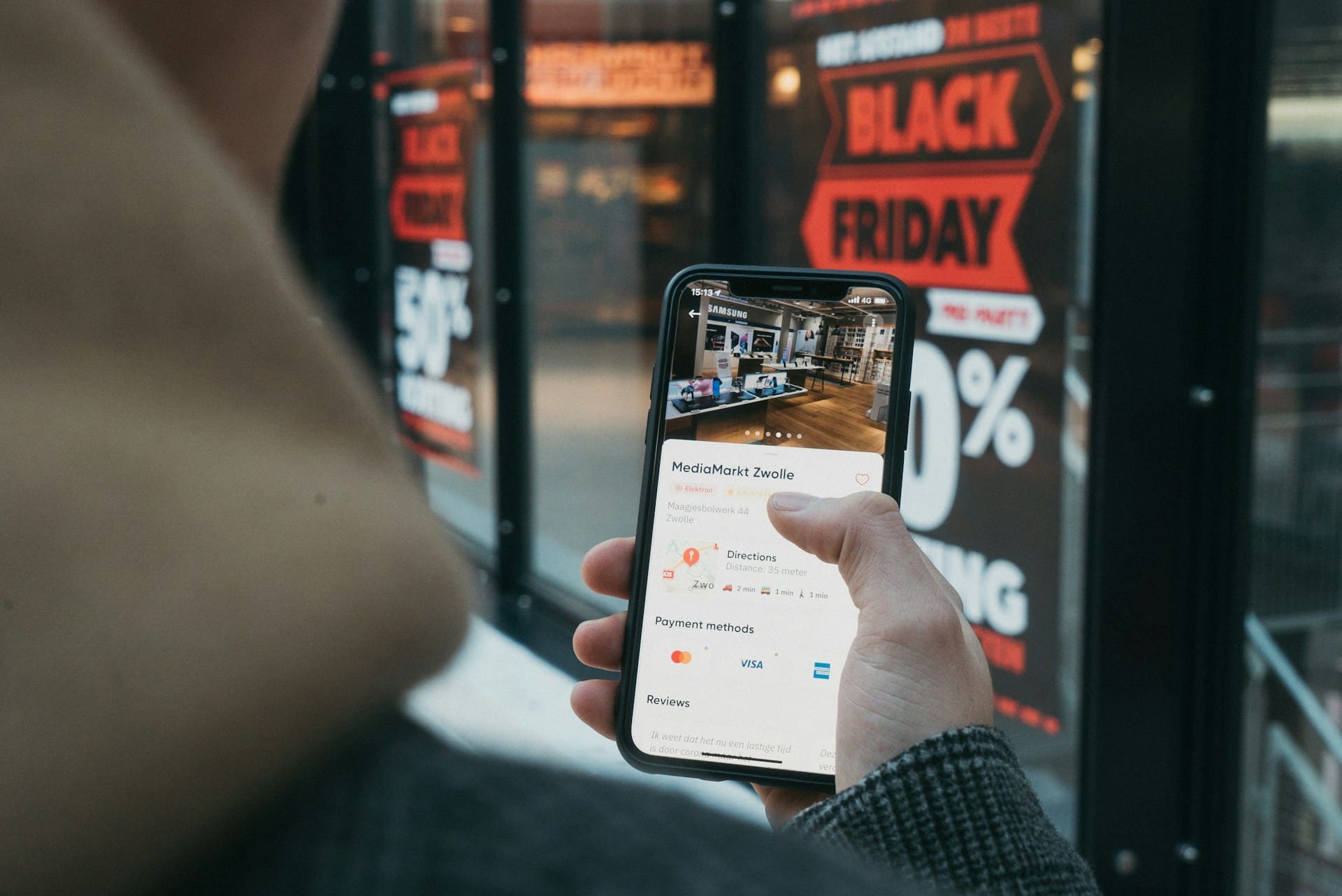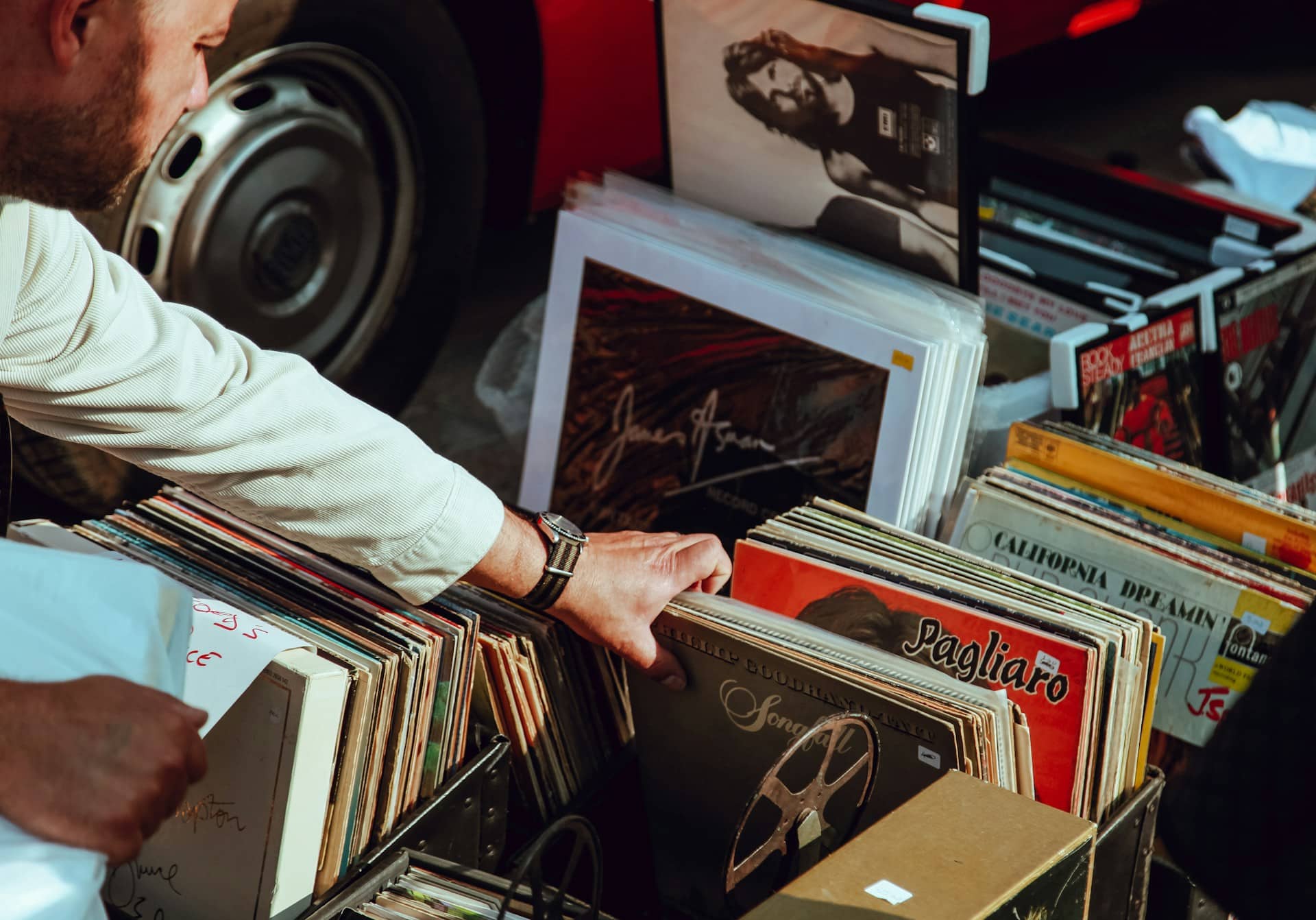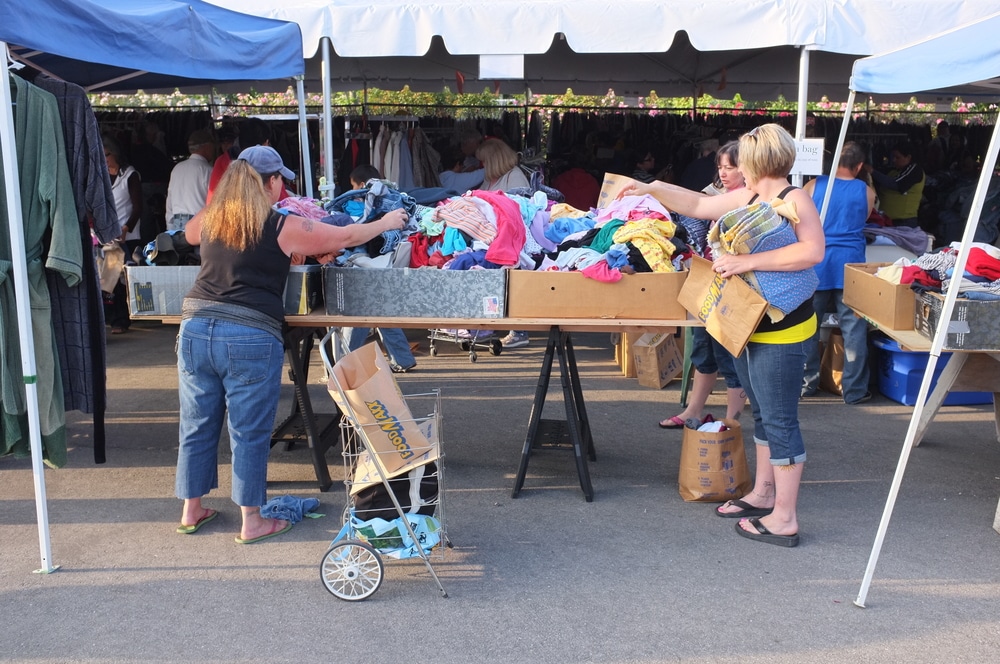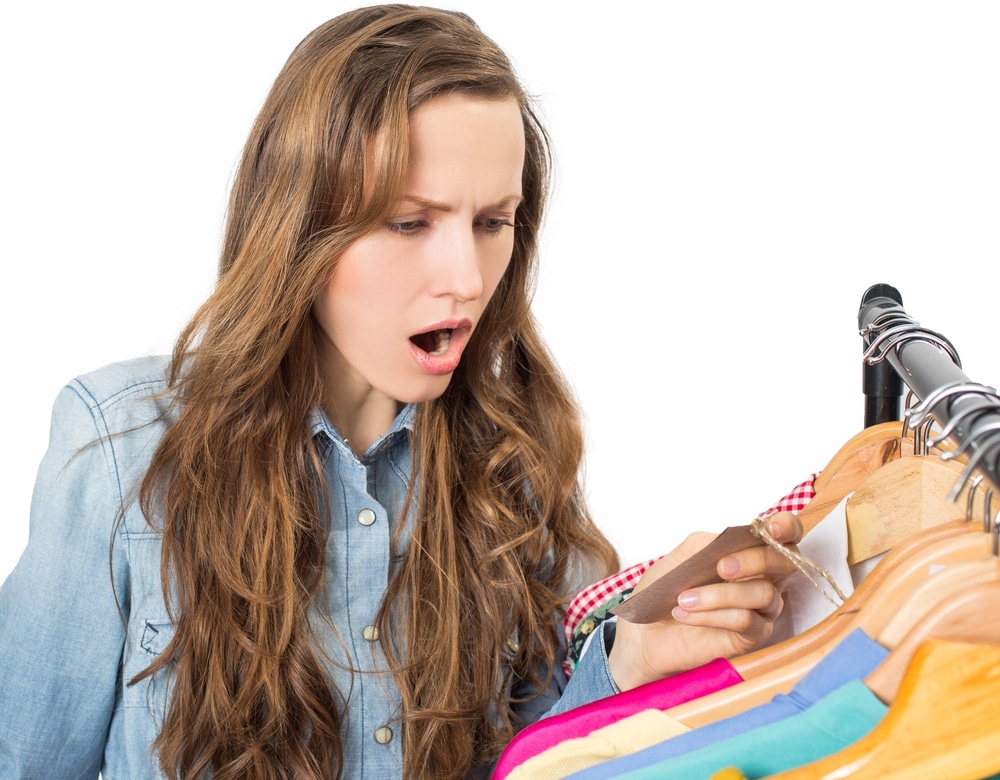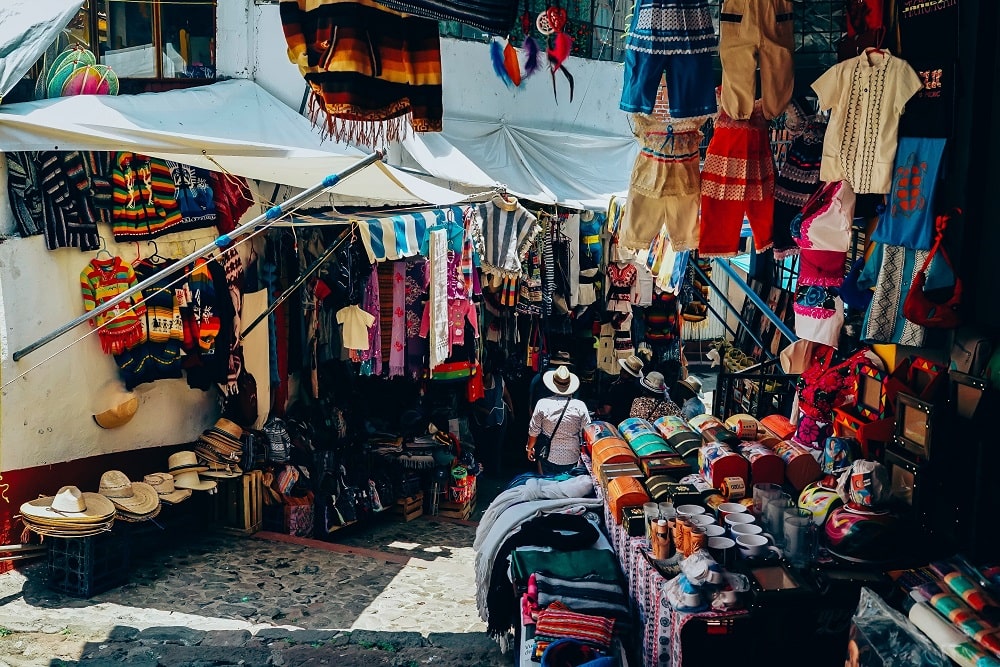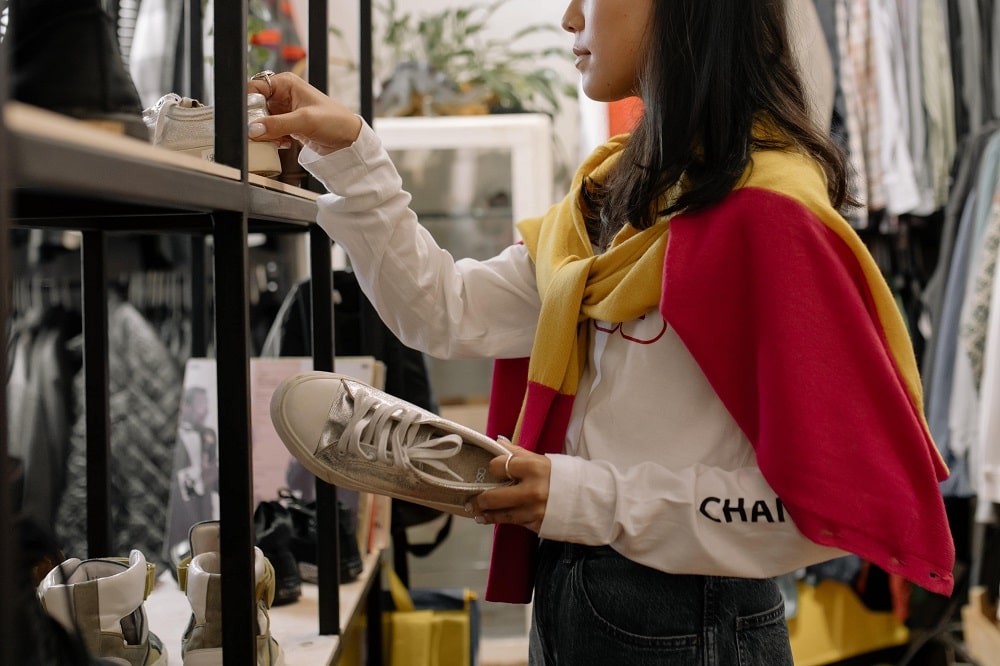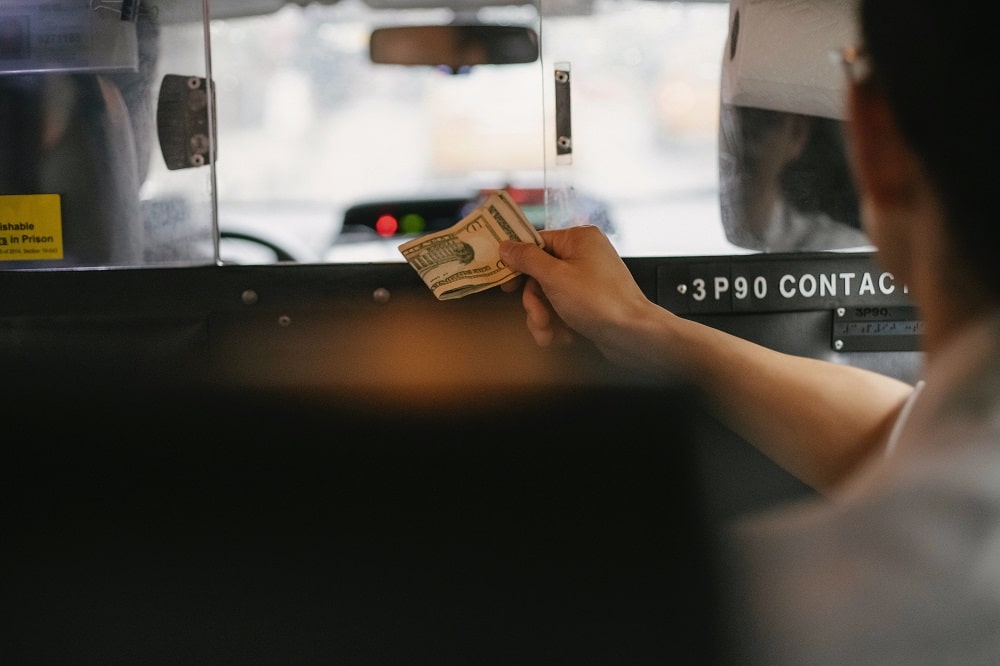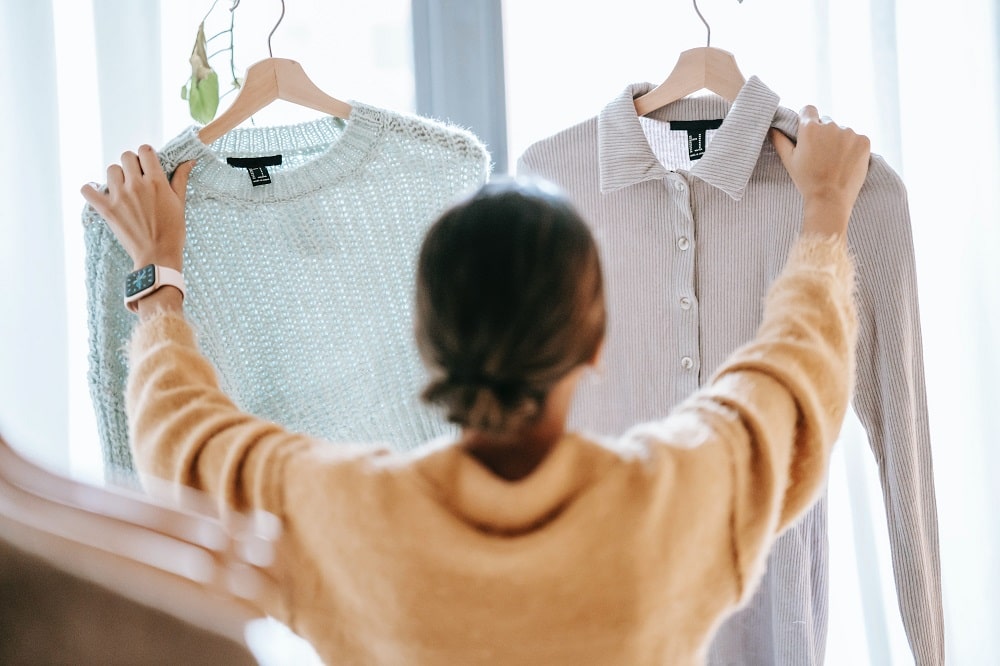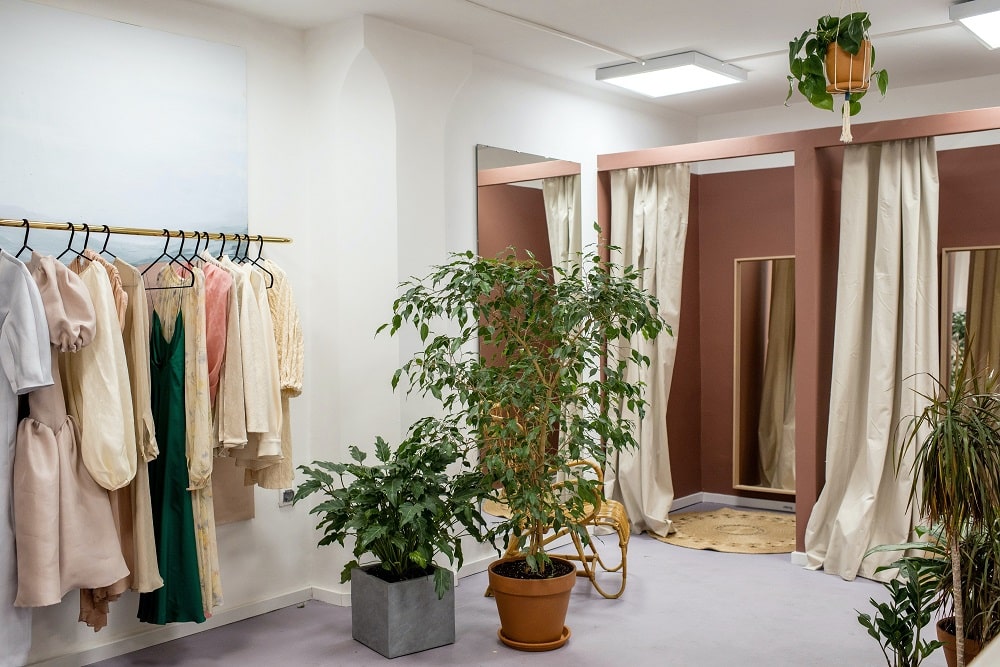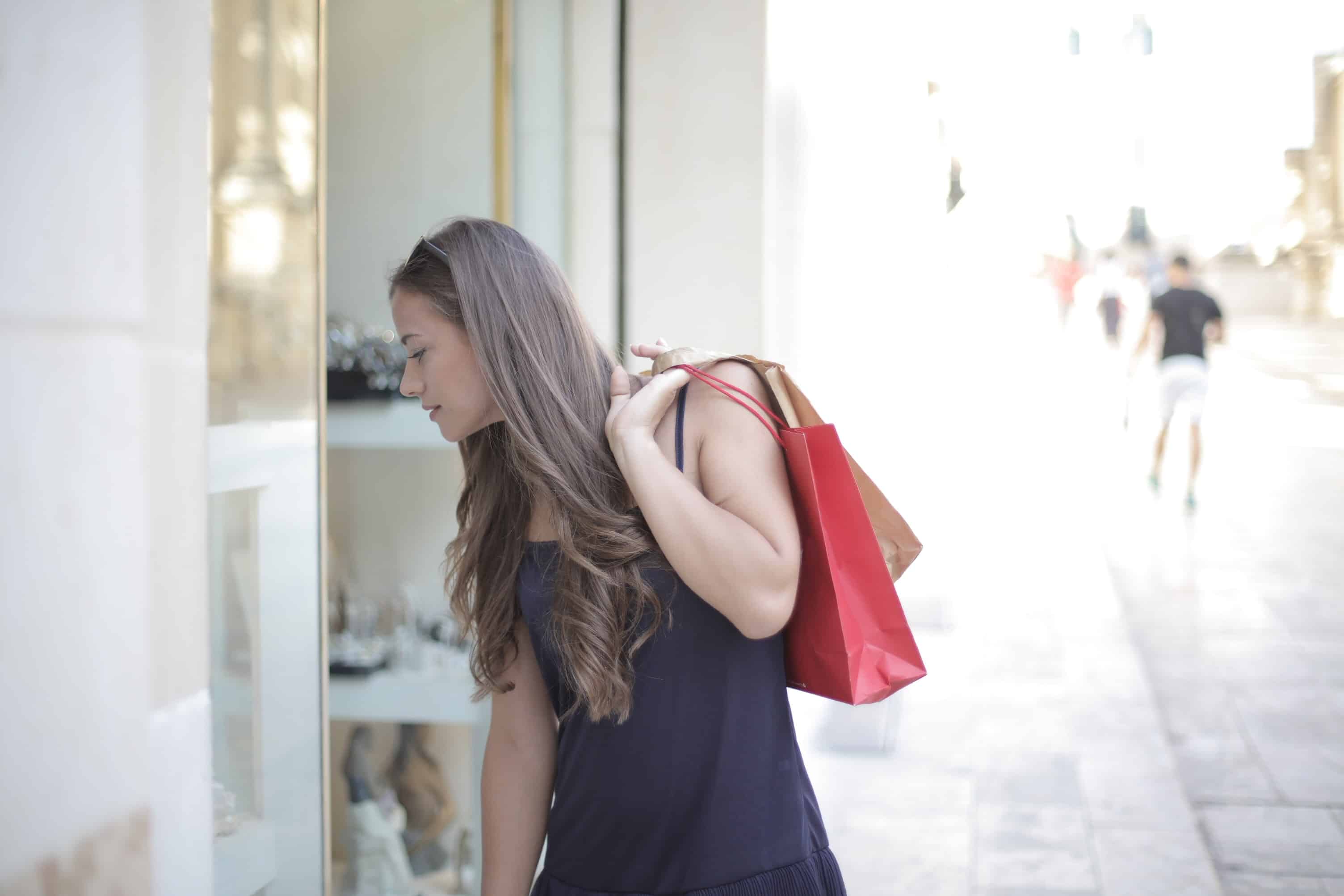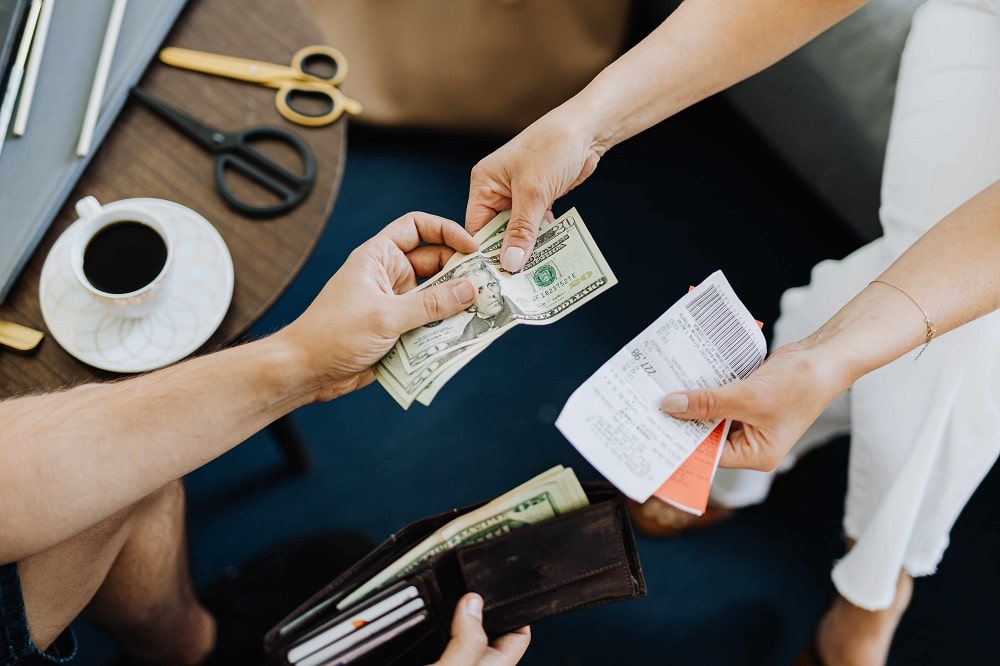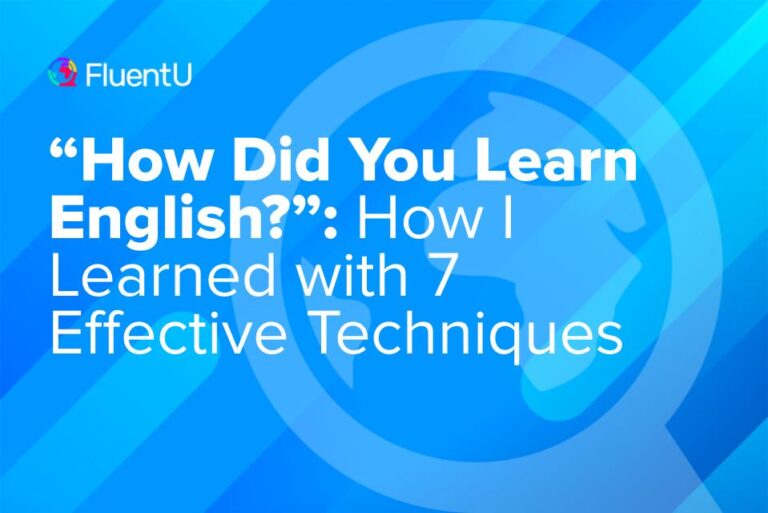Contents
- 1. Black Friday
- 2. Outlet mall
- 3. Yard sale / Garage sale
- 4. To bargain
- 5. What a bargain!
- 6. A steal
- 7. A good deal
- 8. 50% off / $10 off
- 9. Overpriced
- 10. A ripoff
- 11. Stingy
- 12. Flea market
- 13. Thrift store / Thrift shop
- 14. Debit / Credit
- 15. Cashback
- 16. Buy one get one free
- 17. Dressing room / Fitting room
- 18. Window shopping
- 19. Shopping spree
- 20. Receipt
- And One More Thing...
20 Helpful English Shopping Vocabulary Words
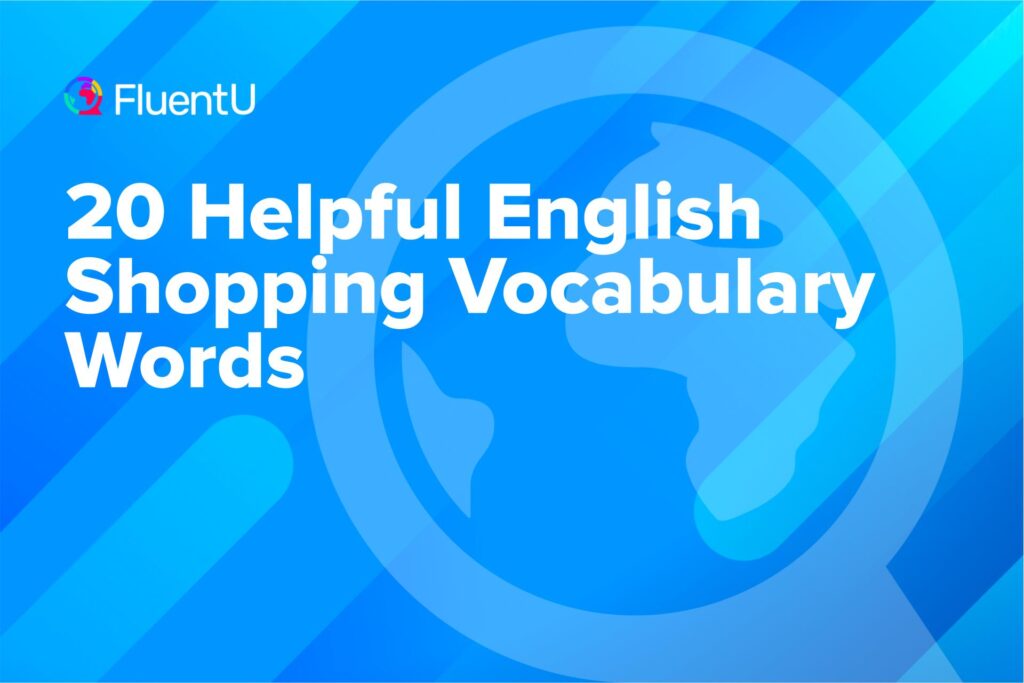
Americans love to shop, and more importantly, we love to talk about shopping. Whether you’re talking to a good friend or someone new, it’s an easy way to start a casual conversation.
So, next time someone asks you where you bought your shoes, make sure you can continue the conversation with these shopping vocabulary words and expressions.
Download: This blog post is available as a convenient and portable PDF that you can take anywhere. Click here to get a copy. (Download)
1. Black Friday
The day after Thanksgiving is the unofficial beginning of the Christmas season.
The Friday after Thanksgiving is called Black Friday. This is when many Americans begin their Christmas shopping.
Almost every store has a huge sale (online and in the store), and many open early.
It’s not an official holiday, but since many Americans have the Friday after Thanksgiving off, many people in malls and stores buy cheap gifts for their friends and family.
2. Outlet mall
An outlet mall is similar to a mall, but they’re not the same thing. Both have many stores in one location.
At both, you can buy a T-shirt from the Gap, then look at watches in Swatch.
However, there is one important difference: an outlet mall sells everything at a reduced price.
Many of them are large and outdoors, and Americans will often spend a full day walking around outlet malls and looking for discounts. It’s a great place to look for sales.
3. Yard sale / Garage sale
As you drive around America in the spring or summer, you’ll see large signs that say “Yard Sale” or “Garage Sale.”
This is when people sell their old clothes, furniture and other items in front of their houses—in their yards or garages.
These sales are great places to find cheap used goods. Interestingly enough, it’s also one of the only times you can bargain in America. What does “to bargain” mean? Read on!
4. To bargain
In many countries, you can bargain in stores and markets. You can ask a seller if paying less for an item you want is OK.
This is not usually OK in America—except at yard sales.
So, if you see a T-shirt for $4 at a yard sale, you can ask for a lower price and bargain with the person selling stuff. For example:
You: “This T-shirt costs four dollars. Will you sell it for two?”
Seller: “How about three dollars?”
You: “Sure.”
5. What a bargain!
You can call it a bargain if you buy something for much less than normal. You may also hear people say, “What a bargain!” if you later tell them you bought an item at a low price.
For example, maybe you’re ordering food and the menu says you can buy two hamburgers for $8. Normally it’s $14 for two. What a bargain!
Or maybe, you found a new phone on sale on Black Friday. It normally costs $150, but you paid $70. Again—what a bargain!
Later, your best friend Jackie sees you using your new phone:
Jackie: “Is that a new phone? How much did it cost?”
You: “Only $70. It was originally $150.”
Jackie: “Wow! What a bargain!”
6. A steal
It’s wrong to steal—to take something without paying for it. But if someone tells you their new dress was “a steal,” that’s a very good thing!
That means they did not pay much for it. They paid so little that it almost felt like stealing. Actually, the meaning of “a steal” is similar to “a bargain.”
For example:
Jackie: “Look! This dress is only $10.”
You: “That dress is a steal! You should buy it.”
7. A good deal
Similar to “a steal” and “a bargain,” if something is a good deal, you paid a low price. However, “a good deal” describes the price, not the object or item.
If you want to use it to describe an object or item, you need to say “a good deal on [noun].” For example:
Incorrect: My car was a good deal.
Correct: I got a good deal on my car.
So, if Jackie is telling you about the car her sister bought, you might have one of these conversations:
You: “Your sister bought a new car? How much did she pay?”
Jackie: “She got a good deal. She only paid $5,000.”
You: “How much did your sister pay for her new car?”
Jackie: “She paid $5,000.”
You: “That’s a really good deal.”
You: “Was your sister’s car expensive?”
Jackie: “No, she got a good deal on her car. It was only $5,000.”
8. 50% off / $10 off
If a store is having a sale, many of their items will cost less than normal. This is called a discount. Usually, you’ll see signs like:
50% off: The price is now 50% less than it was originally.
For example, a $200 sofa is now $100.
$10 off: You’ll pay $10 less than the original price.
For example, a $200 sofa is now $190.
10% off sale price: Sometimes, you can receive an additional discount on sale items.
For example, a $200 sofa is on sale for $150 with an additional 10% off. You’ll pay $135. Awesome!
Now, if you want to tell Jackie about the new sofa you bought, you can tell her:
The sofa was 10% off.
I got 10% off my sofa.
The sofa was on sale for 10% off.
All of these things mean the same thing: your new sofa was a bargain!
9. Overpriced
I like to go to two supermarkets to buy my food: Safeway and Whole Foods.
At Safeway, the food is usually less expensive, but at Whole Foods, they have more organic and healthy food.
Sometimes, I will see the exact same box of strawberries in both supermarkets, but they’re different prices. At Safeway, the box of strawberries costs $2.50. But at Whole Foods, the same box costs $4.
When a store wants you to pay too much for something, that thing is overpriced.
At Whole Foods, their strawberries are overpriced! If I want to save money, I’ll go to Safeway to find a better deal.
More examples:
Don’t buy that couch here, it’s way overpriced. I think you can find a cheaper couch elsewhere.
Groceries at Whole Foods are kind of overpriced. You can find the same things at Safeway and they cost less.
I like this winter coat, but it’s overpriced. I saw the same coat somewhere else and it was 50% off.
The food at the new Italian restaurant is good but overpriced. There’s a pizza place nearby that has the same quality food for half the price.
10. A ripoff
Sometimes, your strawberries are overpriced. Other times, they’re really overpriced. $10 for strawberries?!? Wow!
If you think a price for something is so expensive that it’s unfair, you can call that a ripoff.
Generally, when we call something a ripoff, we feel like someone is cheating us and we are angry about it. For example:
Designer T-shirts are a ripoff. Who wants to pay $90 for a simple T-shirt?
Airplane fees are such a ripoff. I shouldn’t have to pay to check my suitcase!
You can also use “rip off” as a verb. If someone makes you pay too much for something, you can say that person ripped you off.
For example:
The taxi ride should have cost $10, but the driver ripped me off. He charged me $20!
I tried to bargain for this souvenir, but I still think I paid too much. The vendor definitely ripped me off.
Really? You paid $50 for a pair of fake sunglasses? That shop ripped you off!
Grammar note: If you use “to rip off” as a verb, the object comes between rip and off. For example:
He ripped her off.
They ripped you off.
11. Stingy
It’s not always the store that charges too much. Sometimes, the price is fair but you don’t want to spend much money.
You’re stingy if you’re unwilling to spend money—even when you should spend money. Stingy is the opposite of generous.
For example:
Don’t be stingy. You should spend more than $5 on your mom’s birthday gift.
My new boyfriend is so stingy—he never gives enough for the tip at restaurants.
I don’t want to be stingy on this vacation. I want to go out to nice restaurants and stay in a comfortable hotel.
12. Flea market
Flea markets are outdoor areas where shop owners can sell their items on the streets. Usually, they have a booth or table with their items displayed.
In flea markets, you walk around and browse until you find something that catches your attention. Then, you can approach the shop owner’s stand and ask for prices. Some shop owners at flea markets allow bargaining.
You’ll find all sorts of shops in flea markets—not just one type.
For example, people might be selling clothes, candles, homemade snacks and more.
13. Thrift store / Thrift shop
A thrift store (also known as a thrift shop) is a store that sells clothes someone else has already owned. Because of this, the prices are much cheaper than in usual stores.
People who want to get rid of clothes they don’t need, like, wear or fit into anymore can donate them to thrift stores, which then sell them at super affordable prices.
Thrift shop can also be a verb.
To thrift shop means to go shopping at thrift stores to search for good deals.
14. Debit / Credit
If you want to pay with a card instead of cash, there are two kinds: debit cards and credit cards.
When you go to pay, the cashier will usually ask you:
“Are you paying with cash or card?”
If you respond with “card,” the cashier or the screen that you use to pay will ask you if you’re paying with debit or credit.
To pay by debit means you’re using a debit card, which automatically takes the money out of your bank account.
Paying by credit means you’ll use a credit card. Credit cards don’t take the amount out of your bank account. Instead, it keeps a total of how much you’ve spent and you’re expected to pay it off by a certain time.
15. Cashback
Another word you’ll come across when paying with cards is cashback.
When the cashier or payment screen asks if you want cashback, this means you can tell the machine to give you a certain amount of cash after you pay for an additional cost on your card.
For example, if you select that you want $10 cashback, your card will be charged $10 extra and in return, the cashier will give you the $10 in cash.
Another way the term cashback is used is with credit cards.
Many credit cards offer cashback rewards. For example, if your credit card offers 1.5% cashback, this means every time you make a purchase with your credit card, you receive 1.5% of the amount in rewards.
You can later redeem your rewards for things like gift cards, hotel and flight discounts, cash and more.
16. Buy one get one free
When something is “buy one get one free,” it means you get a second product for free when you buy one.
For example, if jeans are “buy one get one free,” you’ll get a second pair of jeans for free when you buy one pair.
The acronym for “buy one get one free” is BOGO. You’ll often see this outside shop windows when the store is running a buy one get one free promotion.
17. Dressing room / Fitting room
The dressing room—also called the fitting room—is where you can try on the clothes you’ve picked out before you buy them.
There will be a sign that shows you where the dressing room is. Some dressing rooms require you to ask an employee to unlock the door, whereas others let you go in and pick whichever room isn’t locked.
18. Window shopping
When you just want to walk around and look at things (but not necessarily buy them), this is called window shopping.
People who go window shopping usually aren’t looking for anything in specific to buy. They just want to get out, go shopping with friends and see what’s out there.
19. Shopping spree
A shopping spree refers to a day where you visit a bunch of stores—usually with friends—and buy lots of things. Usually, this also means you end up spending a lot of money.
Your friend who really likes to shop and has had a stressful week at work might call you and say:
What are you doing this weekend? I really need a shopping spree after this hard week at work.
20. Receipt
When you check out, the cashier will ask if you want your receipt.
The receipt is a small piece of paper with a list of the items you bought, their prices and the total price you paid.
If you end up not liking something you bought and want to return it to get your money back, you’ll need to take the receipt with you to the store.
Congratulations—you now can go on shopping sprees with your American friends, buy groceries, go thrift shopping or just window shop if you’re on a budget!
The more you expose yourself to American culture and the English language, the more naturally you’ll use these phrases.
YouTube has plenty of videos that feature people shopping or talking about what they bought. Make sure you search and study from the right clips, and turn on subtitles if they’re provided!
FluentU can also help since its library of English videos contains content related to everyday matters.
FluentU takes authentic videos—like music videos, movie trailers, news and inspiring talks—and turns them into personalized language learning lessons.
You can try FluentU for free for 2 weeks. Check out the website or download the iOS app or Android app.
P.S. Click here to take advantage of our current sale! (Expires at the end of this month.)

Now, you’ll be fully prepared for when Black Friday comes along!
Download: This blog post is available as a convenient and portable PDF that you can take anywhere. Click here to get a copy. (Download)
And One More Thing...
If you like learning English through movies and online media, you should also check out FluentU. FluentU lets you learn English from popular talk shows, catchy music videos and funny commercials, as you can see here:
The FluentU app and website makes it really easy to watch English videos. There are captions that are interactive. That means you can tap on any word to see an image, definition, and useful examples.
For example, when you tap on the word "searching," you see this:
Learn all the vocabulary in any video with quizzes. Swipe left or right to see more examples for the word you’re learning.

FluentU helps you learn fast with useful questions and multiple examples. Learn more.
The best part? FluentU remembers the vocabulary that you’re learning. It gives you extra practice with difficult words—and reminds you when it’s time to review what you’ve learned. You have a truly personalized experience.
Start using the FluentU website on your computer or tablet or, better yet, download the FluentU app from the iTunes or Google Play store. Click here to take advantage of our current sale! (Expires at the end of this month.)
